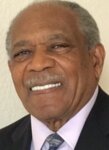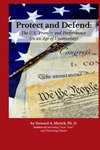Howard Myrick knows what it is like to overcome odds and to battle racist attitudes and practices.
This item is available in full to subscribers.
We have recently launched a new and improved website. To continue reading, you will need to either log into your subscriber account, or purchase a new subscription.
If you are a digital subscriber with an active subscription, then you already have an account here. Just reset your password if you've not yet logged in to your account on this new site.
If you are a current print subscriber, you can set up a free website account by clicking here.
Otherwise, click here to view your options for subscribing.
Please log in to continue |


Howard Myrick knows what it is like to overcome odds and to battle racist attitudes and practices. A Mt. Airy resident for 33 years, he grew up in the racially segregated South.
“I experienced first-hand what it’s like to feel less than a full citizen for whom the words 'all men are created equal' did not apply,” he said in a recent interview. “I know what it is to experience my public-school curricula having no content about African American contributions to American culture, institutions, science, economic prosperity, even being denied the knowledge that the principal of my high school in Jacksonville, Fla., had written the patriotic and inspiring lyrics of 'Lift Every Voice and Sing' that is regarded as the Negro National Anthem.”
Nevertheless, Myrick became a lieutenant colonel in the U.S. Army and a Ph.D. professor at Howard University in Washington, D.C.; Clark University in Atlanta, Ga., and the U.S. Army Command and General Staff College in Fort Leavenworth, Kan, before coming to Temple University, where he taught communications for 27 years and is now a professor emeritus.
Myrick was an adviser in psychological operations and political warfare in Vietnam. He also worked in the Pentagon, in the office of the assistant secretary of defense, as commander of the American Forces Radio-Television Network in Korea, and was director of the American Forces Radio-TV Network worldwide.
Now Myrick has written a book, “Protect and Defend: the U.S. Promise and Performance (in an Age of Uncertainty),” just released April 4, that chronicles his perspective from the 1960s to the present day, observing and commenting on the political landscape he has seen and experienced for more than 50 years.
“It is frightening,” he told us last week, “to witness current – and successful – efforts to ban books, politicize public education, pit parents against public school teachers, even politicize academic practices in colleges and universities. So much of the political discourse and practices lead to a frightening concern that our nation is on a slippery slope toward authoritarianism.”
Myrick was born in Dawson, Ga., and grew up in Jacksonville, Fla. Before coming to Philadelphia, he lived in Paris, Rome, Berlin, Dakar, Cairo, Seoul and Saigon as a military officer. He graduated from Florida A&M with an undergraduate degree in music education, and earned a master's degree and doctorate at the University of Southern California, studying cinema and educational technology.
Was Myrick able to avoid the poison of racism during his distinguished career in the military?
“In spite of being well ahead of the nation in desegregation,” he said, “the members of the U.S. military, both enlisted and officers, were and are recruited from the general society and thus were and are not immune to prevailing ideologies, opinions and practices prevalent in the U.S. So the answer is that I did have to navigate the overt and latent racial prejudices that existed in American society while in the military.”
What was it that enabled Myrick to overcome those roadblocks and achieve a record of laudable service in both the military and academia?
“Above all others, I owe credit to my mother, Lenora Pratt Myrick, who instilled in me an unflagging respect for education,” he said. “She was the young girl who, because there was no high school for 'coloreds' in her hometown of Parrott, Ga., was sent to live with an aunt in Portsmouth, Ohio, so that she might get a high school education.”
In addition, Myrick said, “Those of us African American military officers who had attended historically black colleges and universities, as I did at Florida A & M University, were blessed to have African American officers and enlisted instructors who had served either in the segregated military or in the military that was integrated by President Harry S. Truman’s executive order.”
Myrick is also the author of the 2021 book, “Surviving Toxic 'Isms' and Polarizing Dissent; Protecting Our Democracy” (HRM Media Works, publisher), which was released just before the Jan. 6 insurrection against the Capitol building in Washington, D.C.
This second book was written, Myrick insists, as a warning that “the U.S. is becoming increasingly disunited, that the precepts and values espoused in our Constitution and Bill of Rights are being ignored, and that our nation is at a dangerous crossroads, portending even the demise of democracy.”
Echoing the famous words of a former president, Myrick said, “The shining light of our proverbial city on the hill is being dimmed by enemies from within, by corrupt politicians, conspiracy theorists and even insurrectionists.”
“Protect and Defend” is available on amazon.com. Len Lear can be reached at lenlear@chestnuthilllocal.com